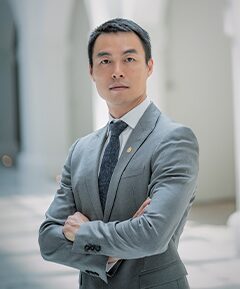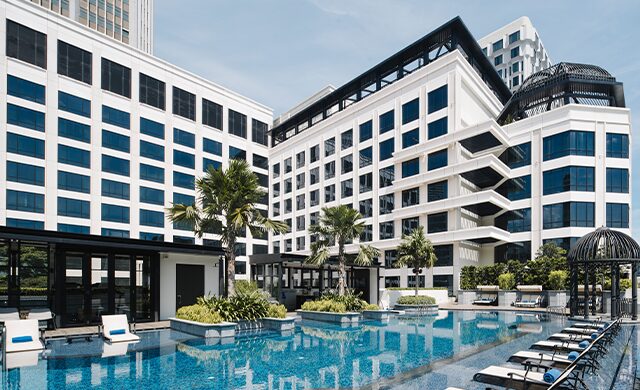Based out of the first region to be affected by COVID-19, hoteliers in Asia have been rapidly devising initiatives to protect and serve communities in alternative ways—whether providing rooms as quarantine facilities for returning nationals or donating protective equipment to healthcare professionals. Considerations are also underway about how best to kickstart the industry once the acute waves of the pandemic have receded. We speak to four leaders from their headquarters in key tourist destinations about the fast-changing situation on the ground.
William Heinecke, Chairman, Minor International, Bangkok

You wrote a letter to Thailand’s Governor and Prime Minister on March 23rd in support of additional measures to restrict movement while voluntarily closing your Bangkok hotels. Now that rules have been introduced extending temporary shutdown to other high-risk areas, is enough being done?
William Heinecke: We understood back then that the main point in combating this pandemic was to limit everyone’s personal movement, stay home, and avoid interaction with others. The government has now enacted these measures, and by all accounts, have flattened the curve. There is a bigger emphasis on family gatherings within the Asian culture so social distancing can seem difficult, but everyone is making the necessary adjustments. Compassion and empathy must form the backbone of our success during this incredibly anxious and uncertain time.
Why have you advocated absorbing short-term economic pain?
WH: Simple short-term measures, as recommended by health experts, are the best way to address the situation and to avoid large-scale job losses, major economic disruptions, and, most importantly, to save lives. That’s why I would support further government action to request hotels across Thailand to close. We have seen the UK and Spain take this step in the interest of public health, something that would also ensure the longterm health of Thailand’s hospitality sector.
How can the Thai industry prepare for recovery?
WH: It’s too early to give an exact indication of when we’ll reopen, but our hotel teams are using this time to seek out new markets, ensure our product offerings remain differentiated, create original experiences, and enhance services. Thailand has shown its resilience through economic crises, political uncertainty, and devastating events like the Erawan Shrine bombing. No one should underestimate the resourcefulness of the Thai people and their yearning for a return to normal day-to-day lives. This will be the driving force behind recovery.
Stefan Leser, CEO, Langham Hospitality Group, Hong Kong

What’s the current outlook for your properties across China?
Stefan Leser: With decreasing numbers of confirmed infections in mainland China, we are seeing small but encouraging signs of travel. We have just initiated the first phase of a recovery plan for our Langham and Cordis brands and, while we remain under tremendous pressure, it’s heartening to see that reservations have started coming in for hotel stays and afternoon tea, notably in Shanghai, Shenzhen, and Guangzhou. Occupancy remains relatively low, but it’s venturing into double digits in these cities.
Where will you be focusing your comeback efforts?
SL: As the world is experiencing the crippling effects of the pandemic at different stages, recovery will come in phases. This will place domestic tourism at the forefront in the road to recovery because there is great concern about secondary waves of infection from “imported” cases. We have leaned in to this strategy with staycation packages and excellent F&B promotions to entice guests, while being mindful of strict social distancing guidelines and hygiene measures at all times.
What factors will determine how quickly the industry can bounce back?
SL: It would be wonderful to have a vaccine, planes flying, theme parks open, weddings taking place, meetings being booked, and restaurants filled with happy diners again. But none of that will happen if people fear for their health and safety while traveling. It is up to all of us in the industry to reassure our guests and employees. To that end, we are maintaining regular communications with corporate clients, leisure guests, the public, and our staff to assuage their apprehensions and let them know how resolutely determined we are to keep our hotels safe for their return.
Henry Fitch, Managing Director, Teardrop Hotels, Colombo, Sri Lanka

How have you been able to support communities in Sri Lanka?
Henry Fitch: While we’re experiencing countrywide curfews and total lockdown at home, we’ve committed—from a human resources point of view—to keep every single team member employed for the next three months, albeit on slightly lower, agreed-upon salaries. In our country, where most people do not have huge savings, we feel that job security is of primary importance. Due to the global nature of the virus, if people lose jobs now, they are unlikely to find employment elsewhere. In the meantime, we’ve taken the opportunity to start working on our Travelife certification to become more sustainable.
What type of external support can you expect?
HF: It’s unrealistic to expect funds from our government to cover staff wages, as has been done in other countries. I feel we’re better off requesting a relaxation of labor laws and improved distribution of soft loans from banks. We were on our knees after last year’s terrorist attacks and were only seeing green shoots of recovery a couple of months ago. Now we’re back to square one, so support of the travel industry on a global scale is imperative. We’ll be working with partners to ensure visitors who had to cancel are able to rebook, while implementing flexible cancellation policies and value additions to encourage new bookings.
What early measures could the global travel industry take?
HF: It’s crucial that governments work with airlines and airports to implement necessary testing. Etihad Airways is trialing an early warning health test, using technology that would take place at check-in and go a long way to ensuring travelers are COVID-19 free. It’s also possible that tourists may need to prove immunity to receive their visas for entry into the country. Longterm, a vaccine is the best boost we could ask for.
Allen Law, CEO, Park Hotel Group, Singapore

How are you adapting to the partial lockdown in Singapore?
Allen Law: Although the hospitality industry has been the hardest hit, we all need to play a part in containment and there are ways in which we can still contribute. As an example, we’ve quickly pivoted our restaurants to offering convenient delivery and drive-through pick-up options for customers required to stay at home for the month. During this period, the community has been in dire need of food donations and volunteers, so our team members have stepped up, helping with preparation and packing. We’ve also contributed meals to frontline healthcare workers.
Which markets will you focus on once travel restrictions ease?
AL: Looking across our regional portfolio, we’re observing healthy pickup in demand in Greater China, where there is stabilization. Since China is ahead, we’ll most likely be placing initial efforts in targeting that market. Travel within ASEAN has always been strong so it demands close monitoring, too. Despite the halt in worldwide travel, it’s important not to reduce engagement with partners and customers on the ground. [In addition], we made masks and sanitizers available to our Park Rewards loyalty program members when stocks were scarce.
For more COVID-19-related news and stories from HD, click here.



